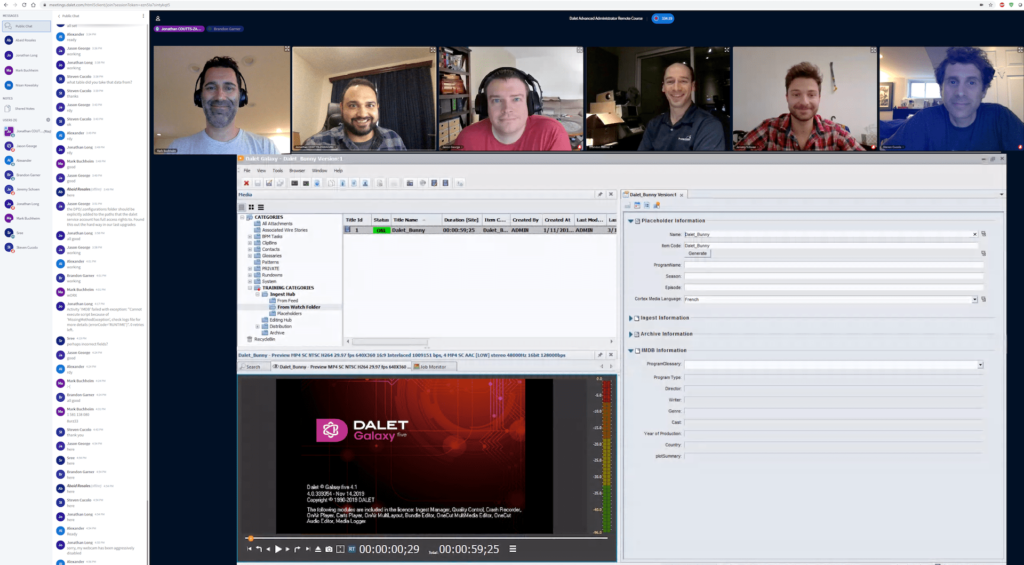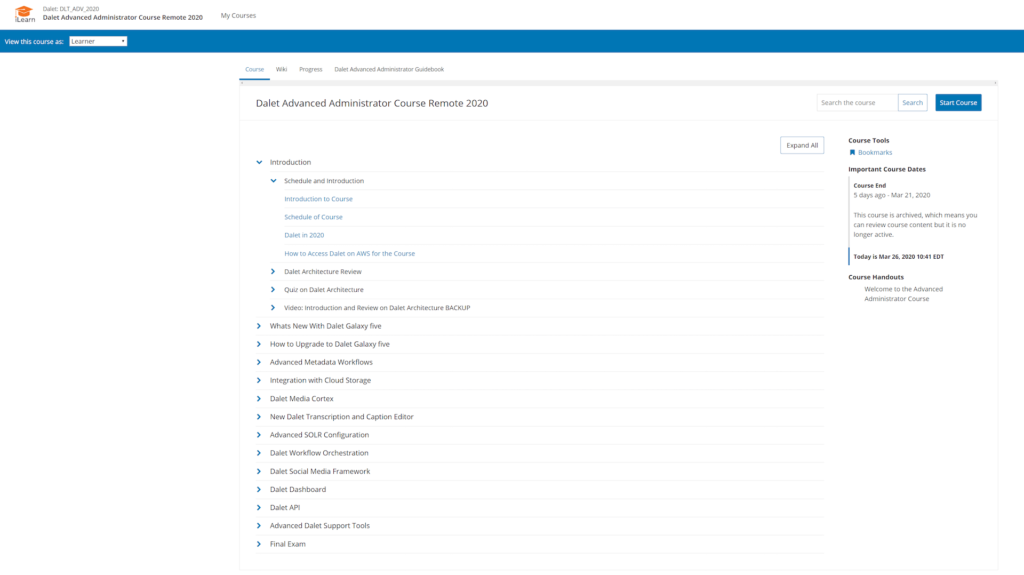Last week, we conducted the first, fully remote Dalet Advanced Administrator Course, with attendees from TMZ, Voice of America, Spectrum, National Geographic, BYU and a number of Dalet project engineers.
While this training was planned to take place in person at the National Geographic Headquarters in Washington D.C., we quickly realized we needed to find a way to keep our attendees safe considering recent developments, without missing out on their learning.
Transforming the admin course into an online training
Over the course of 5 days, and fully online, Dalet Administrators sat at their own homes, often in quarantine, while attending hands-on training about:
- Advanced system architecture
- Metadata-driven workflows – How to create Glossary Terms, XSL transformation, metadata filters, distribution and more
- Advanced media management – Custom Media Formats, Audio Mapping, Source and Target Rendering Formats, Storage Aliases, S3 Media Containers, Third Party Media Migration Policies
- Dalet Media Cortex – How to incorporate Artificial Intelligence in Dalet Media Workflows
- Dalet Workflow Engine – How to build system and user task-based workflows
- Dalet API
- Groovy scripting
- Advanced support tools
And, very importantly, how everyone in the course likes their coffee in the morning!

Providing a seamless, inclusive digital learning experience
Prior to the training, we set up a course on Dalet iLearn with all the training materials including videos, step-by-step configuration guides, presentations, assignments and multiple-choice tests.
We also setup a Dalet Galaxy five instance template running on AWS as the basis for the step-by-step Guidebook. Each student was assigned their own personal Dalet Galaxy five instance.
We used Teamviewer to connect to students’ computers when needed.
We emailed students a Course Guidebook and directions to log into Dalet iLearn, the video conferencing system and their AWS environment.
Hands-on teaching started from day 1, where students followed the instructor on their own training instances, to upgrade their Dalet Galaxy systems to Dalet Galaxy five. If any student ran into issues, the trainer could start a breakout private session to talk with the student, while remotely accessing their computer to resolve an issue or demonstrate an exercise.
While the trainer was on a breakout session, other students could continue working on interactive tasks following Dalet iLearn.
Each class was recorded and will soon be edited into smaller modules to be shared via the Dalet Learning Management System.

What we learnt – Key takeaways
Preparation is key, especially if you are teaching a hands-on course, where students need to configure complex operations such as AI-powered workflows. Test all aspects of course, be it the LMS, the AWS Instance and, of course, that all students know the course prerequisites.
We also learnt that for online training:
- It’s even more important to be punctual (otherwise coffee gets cold, and no one likes cold coffee!)
- Everything that is taught live has to be available in writing too. During the COVID-19 crisis, students were called off often to deal with their own continuity switchovers to enable remote working. Having the LMS content and a guidebook as backup, the students could easily catch up without slowing down the class.
- There should always be a trainer and an assistant for any remote training class, one to assist students with issues/give personal attention and the other to teach the class.
- Everyone learns at their own pace, so give students different options for learning, such as videos, diagrams, presentations or hands on assignments.
- Most students preferred to keep their webcams off, plus it takes up bandwidth. This makes it difficult for the remote trainer to read body language and comprehension cues. Using various forms of assessment, such multiple-choice tests or practical exercises, helps the trainer understand if more explanation or review are needed.
All in all, we felt that remote training can lead to better concentration and students in this course had better overall test results than those of previous in-person courses. During this first fully online remote course, we proved that even very complex subjects can be efficiently taught remotely.
Don’t let distance stop you from learning!
We do not know how long this global crisis will go on for, but as remote working and secluded living takes hold across our countries and the industry, we begin to further appreciate human contact, activities to challenge the mind and tools that help us break the barriers of solitary work in a global company.
Joining a Dalet remote training course is a fantastic way of achieving all that.
Featured in: Dalet Galaxy five | Media Education | Remote Work | Training |
Jonathan Coutts-Zawadzki, Dalet's Head Of Knowledge Management, joined Dalet Technologies in 2006 in the development office as a QA Specialist, documentation expert and trainer. After moving to Dalet France, he became the lead trainer for many projects such as BBC Arabic and NBC Washington, to name a few. He then joined the Dalet Washington office in 2010 as the Project Manager of Dalet’s largest multilingual site, Voice of America. In 2012, Jonathan led Dalet Sales in South Asia as Country Manager of India, based in Delhi. After establishing the Dalet India office, Jonathan has recently taken on the role of Head Of Knowledge Management, working closely with the Sales and Pre-Sales teams to establish a good understanding of customer's needs and workflows.
More Articles By Jonathan


